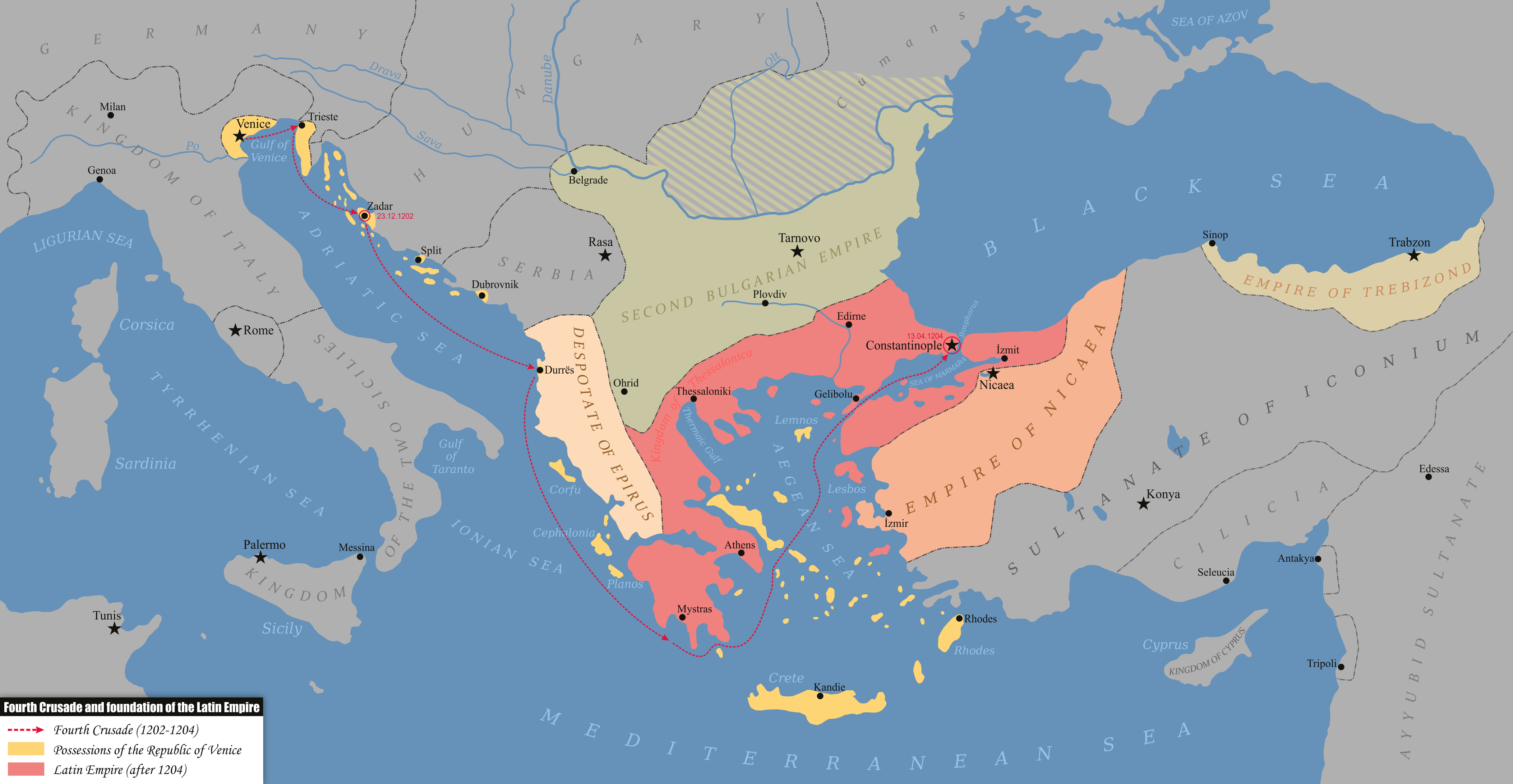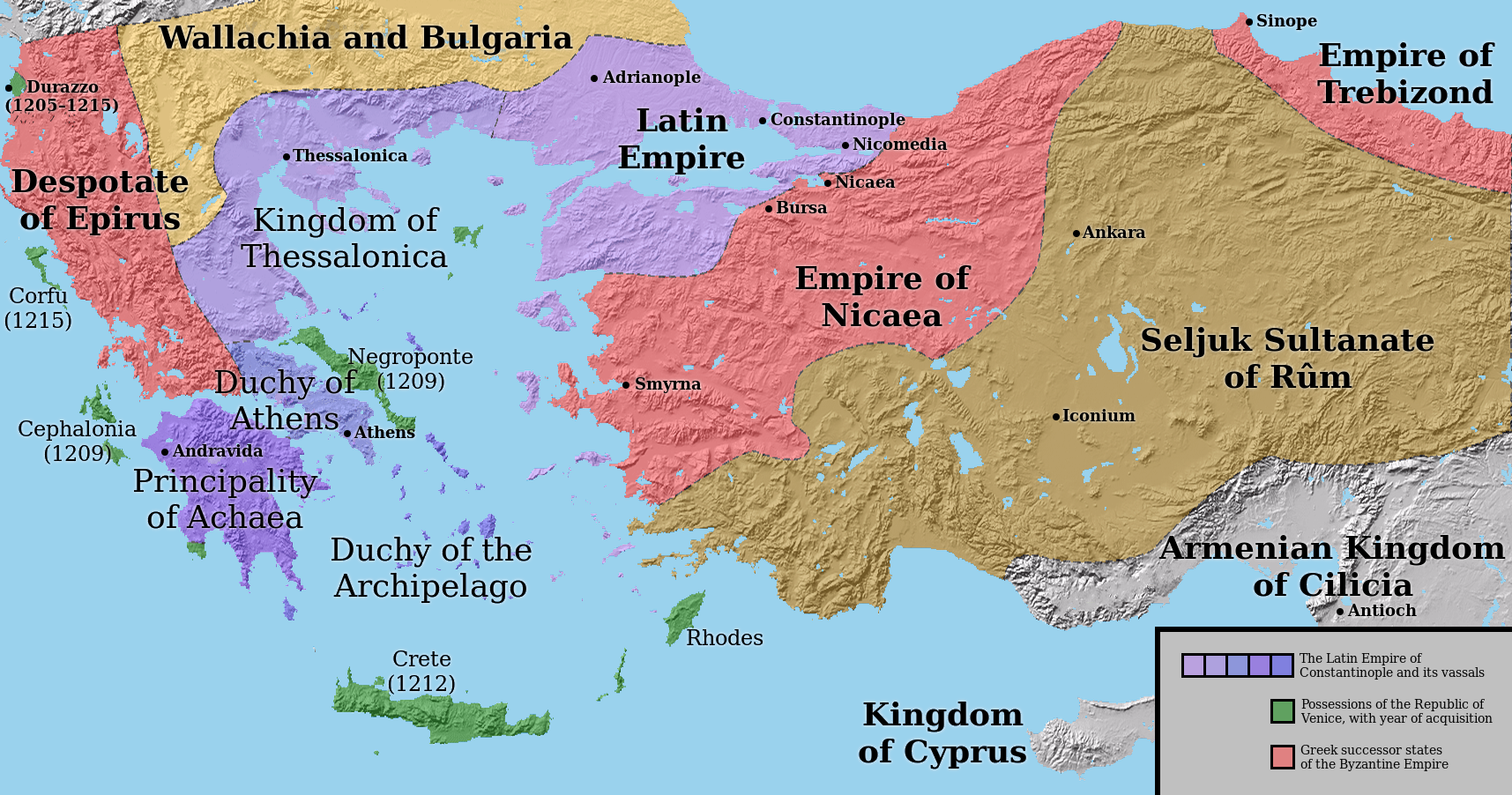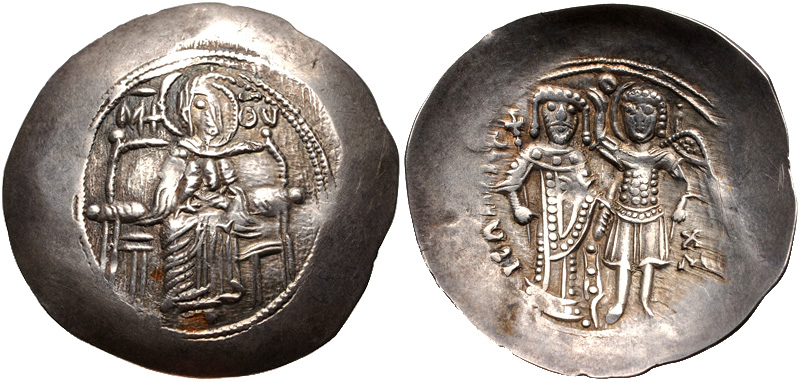|
Despotate Of Epirus
The Despotate of Epirus () was one of the Greek Rump state, successor states of the Byzantine Empire established in the aftermath of the Fourth Crusade in 1204 by a branch of the Angelos dynasty. It claimed to be the legitimate successor of the Byzantine Empire during the subsequent struggle for Constantinople, along with the Empire of Nicaea and the Empire of Trebizond; its rulers briefly proclaiming themselves as Emperors in 1227–1242 (during which it is most often called the Empire of Thessalonica). The term "Despotate of Epirus" is, like "Byzantine Empire" itself, a modern historiographic convention and not a name in use at the time. The Despotate was centred on the region of Epirus, encompassing also Albania and the western portion of Greek Macedonia and also included Thessaly and western Greece as far south as Nafpaktos. Through a policy of aggressive expansion under Theodore Komnenos Doukas the Despotate of Epirus also briefly came to incorporate central Macedonia (regi ... [...More Info...] [...Related Items...] OR: [Wikipedia] [Google] [Baidu] |
Despot Of Epirus
The Despot of Epirus was the ruler of the Despotate of Epirus, one of the rump states of the Byzantine Empire in the aftermath of the Fourth Crusade. The name "Despotate of Epirus" and the title "despot of Epirus" are modern historiographical names, and were not in use by the despots themselves. In the Byzantine Empire, the title of Despot (court title), despot () was a prestigious court title and did not designate rule over some specific territory. Though several of the early Greek rulers of the Epirote realm did use the title of despot, it was never in reference to the lands they governed, but instead in reference to their position in the imperial hierarchy. It was only with Epirus falling into the hands of foreign dynasties that the title of despot became applied not to the imperial hierarchy, but to the territory, sometimes to the dismay of the local population. "Despot of Epirus" is not recorded in contemporary documents for the rulers of foreign origin, but several other vers ... [...More Info...] [...Related Items...] OR: [Wikipedia] [Google] [Baidu] |
Albania
Albania ( ; or ), officially the Republic of Albania (), is a country in Southeast Europe. It is located in the Balkans, on the Adriatic Sea, Adriatic and Ionian Seas within the Mediterranean Sea, and shares land borders with Montenegro to the northwest, Kosovo to the northeast, North Macedonia to the east and Greece to the south. With an area of , it has a varied range of climatic, geological, hydrological and morphological conditions. Albania's landscapes range from rugged snow-capped mountains in the Accursed Mountains, Albanian Alps and the Korab, Central Mountain Range, Albania#Skanderbeg Mountains, Skanderbeg, Pindus and Ceraunian Mountains, to fertile lowland plains extending from the Albanian Adriatic Sea Coast, Adriatic and Albanian Ionian Sea Coast, Ionian seacoasts. Tirana is the capital and largest city in the country, followed by Durrës, Vlorë, and Shkodër. Albania was inhabited by several List of Illyrian peoples and tribes, Illyrian tribes, among them the A ... [...More Info...] [...Related Items...] OR: [Wikipedia] [Google] [Baidu] |
Thessaly
Thessaly ( ; ; ancient Aeolic Greek#Thessalian, Thessalian: , ) is a traditional geographic regions of Greece, geographic and modern administrative regions of Greece, administrative region of Greece, comprising most of the ancient Thessaly, ancient region of the same name. Before the Greek Dark Ages, Thessaly was known as Aeolia (, ), and appears thus in Homer's ''Odyssey''. Thessaly Convention of Constantinople (1881), became part of the modern Greek state in 1881, after four and a half centuries of Ottoman Greece, Ottoman rule. Since 1987 it has formed one of the country's 13 Modern regions of Greece, regions and is further (since the Kallikratis reform of 2011) sub-divided into five regional units of Greece, regional units and 25 municipalities of Greece, municipalities. The capital of the region is Larissa. Thessaly lies in northern central Greece and borders the regions of Macedonia (Greece), Macedonia to the north, Epirus (region), Epirus to the west, Central Greece (geo ... [...More Info...] [...Related Items...] OR: [Wikipedia] [Google] [Baidu] |
Greek Macedonia
Macedonia ( ; , ) is a geographic and former administrative region of Greece, in the southern Balkans. Macedonia is the largest and geographic region in Greece, with a population of 2.36 million (as of 2020). It is highly mountainous, with major urban centres such as Thessaloniki and Kavala being concentrated on its southern coastline. Together with Thrace, along with Thessaly and Epirus occasionally, it is part of Northern Greece. Greek Macedonia encompasses entirely the southern part of the wider region of Macedonia, making up 51% of the total area of that region. Additionally, it widely constitutes Greece's borders with three countries: Albania to the northwest, North Macedonia to the north, and Bulgaria to the northeast. Greek Macedonia incorporates most of the territories of ancient Macedon, a Greek kingdom ruled by the Argeads, whose most celebrated members were Alexander the Great and his father Philip II. Before the expansion of Macedonia under Philip in the 4 ... [...More Info...] [...Related Items...] OR: [Wikipedia] [Google] [Baidu] |
Epirus
Epirus () is a Region#Geographical regions, geographical and historical region, historical region in southeastern Europe, now shared between Greece and Albania. It lies between the Pindus Mountains and the Ionian Sea, stretching from the Bay of Vlorë and the Ceraunian Mountains, Acroceraunian Mountains in the north to the Ambracian Gulf and the ruined Roman Empire, Roman city of Nicopolis in the south.. It is currently divided between the Modern regions of Greece, region of Epirus (region), Epirus in northwestern Greece and the counties of Gjirokastër County, Gjirokastër and Vlorë County, Vlorë in southern Albania. The largest city in Epirus is Ioannina, seat of the Greek region of Epirus, with Gjirokastër the largest city in the Albanian part of Epirus. A rugged and mountainous region, Epirus was the north-west area of ancient Greece. It was inhabited by the Greek tribes of the Chaonians, Molossians, and Thesprotians. It was home to the sanctuary of Dodona, the oldest o ... [...More Info...] [...Related Items...] OR: [Wikipedia] [Google] [Baidu] |
Historiographic
Historiography is the study of the methods used by historians in developing history as an academic discipline. By extension, the term "historiography" is any body of historical work on a particular subject. The historiography of a specific topic covers how historians have studied that topic by using particular sources, techniques of research, and theoretical approaches to the interpretation of documentary sources. Scholars discuss historiography by topic—such as the historiography of the United Kingdom, of WWII, of the pre-Columbian Americas, of early Islam, and of China—and different approaches to the work and the genres of history, such as political history and social history. Beginning in the nineteenth century, the development of academic history produced a great corpus of historiographic literature. The extent to which historians are influenced by their own groups and loyalties—such as to their nation state—remains a debated question. In Europe, the academic dis ... [...More Info...] [...Related Items...] OR: [Wikipedia] [Google] [Baidu] |
Empire Of Thessalonica
The Empire of Thessalonica is a historiographic term used by some modern scholarse.g. ,, , . to refer to the short-lived Byzantine Greek state centred on the city of Thessalonica between 1224 and 1246 ('' sensu stricto'' until 1242) and ruled by the Komnenodoukas dynasty of Epirus. At the time of its establishment during the struggle for Constantinople, the Empire of Thessalonica, under the capable Theodore Komnenos Doukas, rivaled the Empire of Nicaea and the Second Bulgarian Empire as the strongest state in the region, and aspired to capturing Constantinople, putting an end to the Latin Empire, and restoring the Byzantine Empire that had been extinguished in 1204. Thessalonica's ascendancy was brief, ending with the disastrous Battle of Klokotnitsa against Bulgaria in 1230, where Theodore Komnenos Doukas was captured. Reduced to a Bulgarian vassal, Theodore's brother and successor Manuel Komnenos Doukas was unable to prevent the loss of most of his brother's conquests in M ... [...More Info...] [...Related Items...] OR: [Wikipedia] [Google] [Baidu] |
Empire Of Trebizond
The Empire of Trebizond or the Trapezuntine Empire was one of the three successor rump states of the Byzantine Empire that existed during the 13th through to the 15th century. The empire consisted of the Pontus, or far northeastern corner of Anatolia, and portions of southern Crimea. The Trapezuntine Empire was formed in 1204 with the help of Queen Tamar of Georgia after the Georgian expedition in Chaldia and Paphlagonia, which was commanded by Alexios Komnenos a few weeks before the Sack of Constantinople. Alexios later declared himself emperor and established himself in Trebizond (now Trabzon in Turkey). Alexios and David Komnenos, grandsons and last male descendants of the deposed emperor Andronikos I Komnenos, pressed their claims as Roman emperors against Alexios V Doukas. While the rulers of Trebizond bore the title of emperor until the end of their state in 1461, their rivals, the Laskarids in Nikaia and the Palaiologoi in Constantinople contested their claim to t ... [...More Info...] [...Related Items...] OR: [Wikipedia] [Google] [Baidu] |
Empire Of Nicaea
The Empire of Nicaea (), also known as the Nicene Empire, was the largest of the three Byzantine Greeks, Byzantine Greek''A Short history of Greece from early times to 1964'' by Walter Abel Heurtley, W. A. Heurtley, H. C. Darby, C. W. Crawley, C. M. Woodhouse (1967), p. 55: "There in the prosperous city of Nicaea, Theodoros Laskaris, the son in law of a former Byzantine Emperor, establish a court that soon become the Small but reviving Greek empire." rump states founded by the aristocracy of the Byzantine Empire that fled when Constantinople was occupied by Western European and Republic of Venice, Venetian armed forces during the Fourth Crusade, a military event known as the Sack of Constantinople. Like the other Byzantine rump states that formed due to the 1204 fracturing of the empire, such as the Empire of Trebizond and the Despotate of Epirus, it was a continuation of the eastern half of the Roman Empire that survived well into the Middle Ages. A fourth state, known in histori ... [...More Info...] [...Related Items...] OR: [Wikipedia] [Google] [Baidu] |
Struggle For Constantinople
Struggle may refer to: Film and TV * ''Struggle'' (2003 film), an Austrian film * Struggle (2013 film) * ''Struggle'' (TV series), 2007 Chinese TV series Music * ''Struggle'' (Nonpoint album), 1999 release * Struggle (Woody Guthrie album), 1990 * "Struggle", a song by Ashanti from the 2008 album ''The Declaration'' * "Struggle", a 1989 song by Keith Richards * "Struggle", a 2002 song by Radio 4 * "Struggle", a song by Jay Chou from the 2004 album ''Common Jasmine Orange'' See also * Class struggle, a key concept in Marxism * Conflict * ''My Struggle'', or ''Mein Kampf'', book by Adolf Hitler * ''Struggle'', newsletter of the Southern Africa Support Project * The Greek War of Independence was referred to by Greeks in the 19th century as the Αγώνας, ''Agonas'', "Struggle" * The Struggle (other) * Struggle session Struggle sessions (), or denunciation rallies or struggle meetings, were violent public spectacles in Maoist China where people accused of being " ... [...More Info...] [...Related Items...] OR: [Wikipedia] [Google] [Baidu] |
Angelos
The House of Angelos (; pl. Angeloi; , pl. ) was a Byzantine Greek noble family that produced several Emperors and other prominent nobles during the middle and late Byzantine Empire. The family rose to prominence through the marriage of its founder, Constantine Angelos, with Theodora Komnene, the youngest daughter of Emperor Alexios I Komnenos. As imperial relatives, the Angeloi held various high titles and military commands under Emperor Manuel I Komnenos. In 1185, following a revolt against Andronikos I Komnenos, Isaac II Angelos rose to the throne establishing the Angeloi as the new imperial family that ruled until 1204. The period was marked by the decline and fragmentation of the Byzantine Empire, culminating in its dissolution by the Fourth Crusade in 1204 under Alexios IV Angelos. After the Fourth Crusade, another branch of the family managed to establish an independent state in Epirus, which quickly expanded to rule Thessaly and Macedonia. The members of this branch la ... [...More Info...] [...Related Items...] OR: [Wikipedia] [Google] [Baidu] |
Fourth Crusade
The Fourth Crusade (1202–1204) was a Latin Christian armed expedition called by Pope Innocent III. The stated intent of the expedition was to recapture the Muslim-controlled city of Jerusalem, by first defeating the powerful Egyptian Ayyubid Sultanate. However, a sequence of economic and political events culminated in the Crusader army's 1202 siege of Zara and the 1204 sack of Constantinople, rather than the conquest of Egypt as originally planned. This led to the Partitio terrarum imperii Romaniae or the partition of the Byzantine Empire by the Crusaders and their Venetian allies leading to a period known as Frankokratia, or "Rule of the Franks" in Greek. In 1201, the Republic of Venice contracted with the Crusader leaders to build a dedicated fleet to transport their invasion force. However, the leaders greatly overestimated the number of soldiers who would embark from Venice, since many sailed from other ports, and the army that appeared could not pay the contracted price. I ... [...More Info...] [...Related Items...] OR: [Wikipedia] [Google] [Baidu] |










